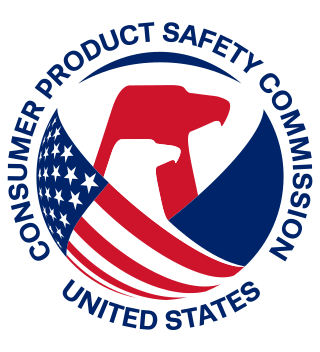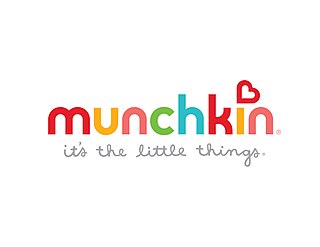Related Research Articles

Infant formula, also called baby formula, simply formula, baby milk or infant milk, is an ultra-processed food designed and marketed for feeding to babies and infants under 12 months of age, usually prepared for bottle-feeding or cup-feeding from powder or liquid. The U.S. Federal Food, Drug, and Cosmetic Act (FFDCA) defines infant formula as "a food which purports to be or is represented for special dietary use solely as a food for infants by reason of its simulation of human milk or its suitability as a complete or partial substitute for human milk".

The Easy-Bake Oven is a working toy oven introduced in 1963 by Kenner and currently manufactured by Hasbro. The original toy used a pair of ordinary incandescent light bulbs as a heat source; current versions use a true heating element. Kenner sold 500,000 Easy-Bake Ovens in the first year of production. By 1997, more than 16 million Easy-Bake Ovens had been sold.

Dorel Industries Inc. is a Canadian company, based in Montreal, Quebec, which designs and manufactures juvenile products and home furnishings. Its Dorel Sports division, sold in 2022, sold bicycles. It was formed in 1987 as a result of a merger between Dorel Co. Ltd., founded in 1962 by Leo Schwartz and Ridgewood Industries, founded in 1969. Dorel employs approximately 10,000 people and its products are sold in over 100 countries.

A product recall is a request from a manufacturer to return a product after the discovery of safety issues or product defects that might endanger the consumer or put the maker/seller at risk of legal action.

The United States Consumer Product Safety Commission is an independent agency of the United States government. The CPSC seeks to promote the safety of consumer products by addressing "unreasonable risks" of injury ; developing uniform safety standards ; and conducting research into product-related illness and injury. In part due to its small size, the CPSC attempts to coordinate with outside parties—including companies and consumer advocates—to leverage resources and expertise to achieve outcomes that advance consumer safety. The agency was created in 1972 through the Consumer Product Safety Act. The agency reports to Congress and the President; it is not part of any other department or agency in the federal government. The CPSC has five commissioners, who are nominated by the president and confirmed by the Senate for staggered seven-year terms. Historically, the commission was often run by three commissioners or fewer. Since 2009, however, the agency has generally been led by five commissioners, one of whom serves as chairman. The commissioners set policy for the CPSC. The CPSC is headquartered in Bethesda, Maryland.

Baby Einstein is an American franchise and line of multimedia products, including home video programs, CDs, books, flash cards, toys, and baby gear that specialize in interactive activities for infants and toddlers under three years old, created by Julie Aigner-Clark. The franchise is produced by The Baby Einstein Company.

Playskool is an American brand of educational toys and games for children. The former Playskool manufacturing company was a subsidiary of the Milton Bradley Company and was headquartered in Chicago, Illinois. Playskool's last remaining plant in the aforementioned city was shut down in 1984, and Playskool became a brand of Hasbro, which had acquired Milton Bradley that same year.

Ideal Toy Company was an American toy company founded by Morris Michtom and his wife, Rose. During the post–World War II baby boom era, Ideal became the largest doll-making company in the United States. Their most popular dolls included Betsy Wetsy, Toni, Saucy Walker, Shirley Temple, Miss Revlon, Patti Playpal, Tammy, Thumbelina, Tiny Thumbelina, and Crissy. The company is also known for selling the Rubik's Cube.

Mongoose is an American brand name of bicycles originally designed, manufactured, and sold by BMX Products, Inc. It is now available through the distributor Pacific Cycle.

Toy safety is the practice of ensuring that toys, especially those made for children, are safe, usually through the application of set safety standards. In many countries, commercial toys must be able to pass safety tests in order to be sold. In the U.S., some toys must meet national standards, while other toys may not have to meet a defined safety standard. In countries where standards exist, they exist in order to prevent accidents, but there have still been some high-profile product recalls after such problems have occurred. The danger is often not due to faulty design; usage and chance both play a role in injury and death incidents as well.

Fisher-Price, Inc. is an American company that produces educational toys for infants, toddlers and preschoolers, headquartered in East Aurora, New York. It was founded in 1930 during the Great Depression by Herman Fisher, Irving Price, Helen Schelle and Margaret Evans Price.
The Kind + Jugend Innovation Award is a German design award granted annually to the best overall baby product in the areas of design, safety, user-friendliness, degree of innovation, and quality of workmanship. Particular emphasis is placed on innovation and safety, with past winners displaying unique designs and new technology.

The 2008 Chinese milk scandal was a significant food safety incident in China. The scandal involved Sanlu Group's milk and infant formula along with other food materials and components being adulterated with the chemical melamine, which resulted in kidney stones and other kidney damage in infants. The chemical was used to increase the nitrogen content of diluted milk, giving it the appearance of higher protein content in order to pass quality control testing. 300,000 affected children were identified, among which 54,000 were hospitalized, according to the latest report in January 2009. The deaths of six babies were officially concluded to be related to the contaminated milk.
Artsana Group is an Italian company that was founded in 1946 by Pietro Catelli as a commercial business specialised in venipuncture and medication, and is still active today in the distribution of healthcare and infant care products. It is also noted for the manufacture of products for children.
Shilav Group is an Israeli company which operates a chain of toy stores in Israel, a line of developmental toys for babies, and a line of apparel for newborns, infants, and toddlers.
Lamaze Infant Development System is a line of baby toys belonging to Takara Tomy, which acquired the former owner, RC2 Corporation and its subsidiary Learning Curve Brands, in 2011. The name Lamaze is licensed by Lamaze International, a Washington, D.C. based nonprofit organization. The toys are developed in collaboration with Jerome and Dorothy Singer, psychologists at Yale University.
The RC2 Corporation, a division of Japan-based firm Takara Tomy, is a toy design, marketing, and distribution company headquartered in Oak Brook, Illinois, United States. Founded in 1992.
Kids 2, Inc., doing business online as Kids2, is an American infant and toddler toy and product manufacturer based in Atlanta, Georgia. The company designs, manufactures and markets Bright Starts, Baby Einstein, and Ingenuity brand products. Kids 2 has international affiliate operation locations in Australia, Canada, Europe, China, Hong Kong, Japan, and Mexico. In 2013, Kids II had more than 400 products under its brands.

Munchkin, Inc. is a privately-held company headquartered in Van Nuys, California known for designing, developing, manufacturing and distributing infant and toddler products. It was founded in 1991 by Steven B. Dunn, its CEO.
The American Character Doll Company was an American toy company specializing in dolls. Their most popular dolls included "Tiny Tears," "Tressy," "Butterball Doll", "Sweet Sue," and "Toodles." Founded in 1919, the company's fortunes peaked in the mid-20th century, as they sold millions of dolls exclusively to retailers and mail-order houses such as Sears and Montgomery Ward. The company was the first to produce mass-marketed rubber dolls in the United States. American Character Dolls went bankrupt in 1968, with their assets acquired by the Ideal Toy Company.
References
- 1 2 3 4 "Not just baby's play", ISRAEL21c, May 16, 2004, accessed April 25, 2010.
- ↑ Shilav Group website, "The Tiny Love Success Story Limit", accessed April 25, 2010; see also this archived page from 2011.
- 1 2 3 U.S. Consumer Product Safety Commission, " Tiny Love Recalls Wind Chime Toys Due to Puncture and Laceration Hazards", press release, February 10, 2010 (accessed April 25, 2010).
- ↑ "Tiny Love, Ltd.", Parents' Choice: Children's media and toy reviews, accessed April 25, 2010.
- ↑ Goliath listing, accessed April 25, 2010.
- ↑ Tinylove.com, archived here.
- ↑ Tiny Love, Ltd. is a company of between 20 and 50 employees, headquartered at 72 Rosen Pinchas, Tel Aviv-Jaffa, Israel. See Duns Guide Global: Israel Business Guide, "Tiny Love, Ltd.", accessed 1 June 2021.
- ↑ Tiny Love website, "Terms of use", accessed April 25, 2010.
- ↑ See U.S. Consumer Product Safety Commission, " Tiny Love Recalls Wind Chime Toys Due to Puncture and Laceration Hazards", press release, February 10, 2010 (accessed April 25, 2010).
- ↑ Tiny Love, Inc. is headquartered at 131 west 33rd street, New York, NY 10001. See the Tiny Love website, "Terms of use", accessed April 25, 2010.
- ↑ See U.S. Patent number D547993, issued August 7, 2007 (application number 29/260,996, filed June 6, 2006).
- ↑ "Patent application title: Infant activity mattress", patent application number 20090253342, Patentdocs, accessed April 25, 2010. This patent application states in part: "The activities which an infant carries out in the first months of its life plays an important role in the infant's acquisition of basic motor skills and in its ability to recognize differences in the shapes, colors and sizes of various objects, as well as differences between musical tones and other sounds. It is only by experience that the infant learns how to properly manipulate its arms and legs and to understand the nature of what it sees and hears. An infant whose activities in this crucial period are restricted, may suffer from an arrested development which may interfere with his future progress. In order to stimulate an infant into activities that will advance its development during the earliest period of its life, it is known to provide for this purpose an activity center designed to induce the infant occupying the center to turn around, to raise its head, to move its arm and leg appendages and to engage in other beneficial activities."
- 1 2 Tiny Love website, "Product Development", accessed April 25, 2010.
- ↑ Tiny Love website, "Recall Information", accessed April 25, 2010.